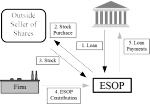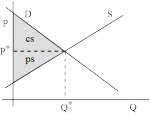Here are a few newspaper and magazine clippings from my efforts in Slovenia in 1990-91 to get a worker-ownership privatization law drafted and passed.
Talks and Publications in 2014
This is my 2014 yearly update on talks and publications (snarky emails and FB comments not included).
Talk on Alienation versus Delegation at Troy University
These are the slides for a talk on Alienation versus Delegation at a conference on Philanthropy and the Economic Way of Thinking at Troy University, Troy, Alabama November 7, 2014.
Talk on property theory at UMKC, Nov. 2014
These are the slides, with some minor additions and editing, for a talk On Property Theory given at the University of Missouri at Kansas City Economic Department November 17, 2014.
Property and Production
This is the 30th anniversary of the publication of this paper, Property and Production, which laid out the whole property-theoretic analysis of production. I would not change a word today.
Zagreb Talk Sept 2014
These are the slides and a video of a talk in Zagreb Sept. 8, 2014 on green issues and ESOPs.
On a fallacy in the Kaldor-Hicks efficiency-equity analysis
This paper shows that implicit assumptions about the numeraire good in the Kaldor-Hicks efficiency-equity analysis involve a “same-yardstick” fallacy.
Parallel Experimentation
The theme of parallel experimentation is used to recast and pull together dynamic and pluralistic theories in economics, political theory, philosophy of science, and social learning.
Making Enterprises and Markets Responsible
This is a paper written to further Richard Cornuelle’s abiding vision of a more responsible economy and posted here to invite comment. The basic idea is revisit the whole idea of a market economy dominated by absentee-owned and publicly traded corporations (“Wall Street Capitalism”) that disconnect companies (“the Mother of all disconnects”) from the natural desires of the people working in the companies to improve their communities.






